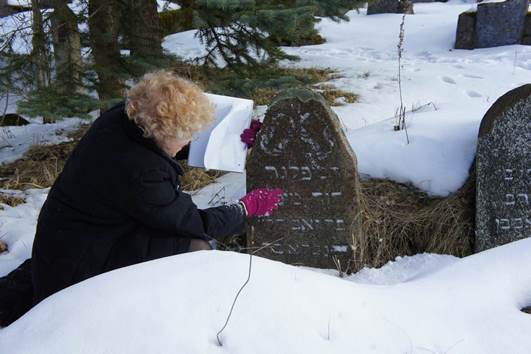On my first visit to Lithuania, I found my great-grandfather's gravestone in a Jewish cemetery near the town of Rokiskis in the northeast corner of the country.
The grassy paths of the old graveyard were clogged with blackberry vines. Some of the headstones had fallen face down into the earth. Yet as I knelt down and offered my respects to my ancestor, Dovid Mikhl Levin, I sensed a blessing coming back to me in return.
In the years since I traced those Hebrew letters covered with moss, the Jewish cemetery of Rokiskis has been refurbished. Jewish descendants from all over the world have worked with local officials and the regional museum to erect an iron fence and a memorial bearing poignant words by a Lithuanian poet:
...fallen asleep in the cemetery, they wait still for their children
from "The Jewish Cemetery"by Vytautas P. Bloze (1930 - )(translated by Laima Sruoginis)
In Rokiskis, the project of remembrance goes beyond honoring the resting place of the dead. The town has taken action to mark not only places of Jewish death but also of Jewish life.
Last summer, Mayor Antanas Vagonis unveiled a large sign on a Rokiskis street still known as Synagogue Street, where three Jewish study houses used to stand - including the one where my great-grandfather used to spend his days.
The sign makes clear that in Rokiskis, as in many Lithuanian towns, Jews once constituted more than half of the population. For 300 years, Jews participated actively in the town's economic, cultural, and political life.
With the coming of Soviet rule in the 1940, Jewish businesses in Rokiskis were expropriated and some Jews, along with non-Jewish neighbors, were deported to Siberia. Then came the Holocaust. In August, 1941, thousands of Jews from the Rokiskis region were shot and buried in the forest by German invaders and their local collaborators. The mass killing site is marked with a memorial.
More than 90 percent of Lithuanian Jews perished during the Holocaust. Today only 4,000 Jews live in Lithuania. No Jews live in Rokiskis.
During the postwar Soviet era, some Jewish cemeteries - though not the one in Rokiskis - were razed. Tombstones were used as building materials. After Lithuania gained its independence from the Soviet Union, steps were taken to remove egregious examples of this disrespect. But Jewish gravestones are still being discovered in streets, walls, and other places where they do not belong, and controversy continues to erupt over such sites as the sports stadium that was built during the Soviet era on the site of a Jewish cemetery near Vilnius.
Maceva is a Lithuanian effort named for the Hebrew and Yiddish word for "gravestone." Its aim is to preserve the hundreds of Jewish cemeteries still extant in Lithuania and to digitize the names of those buried there.
Through the organization, high school students clear brush and trash and record the names on the stones. It is one way that young Lithuanians are finding to connect themselves with Jewish heritage.
Discovering my great-grandfather's grave was only the beginning of my connection with the land of my forebears, a connection that has grown stronger over the years. I've been back to Rokiskis to visit the grave. I've filled my eyes with the ochre-colored wooden houses, the fields and the barns. I've walked the road called Synagogue Street. I've breathed that air.
I've also reached out to people in Lithuania, Jews and non-Jews, who are helping their fellow citizens to remember their nation's Jewish heritage - including the Holocaust - and to use an understanding of the past to build a more tolerant future.
For Jewish descendants, a journey of return to Lithuania - a land where Jewish culture once flourished and where Jews and their culture were cruelly annihilated - is no simple proposition.
Yet when the mayor of Rokiskis unveiled the sign on Synagogue Street, he spoke of it as a bridge.
"Bridges serve not only for remembering," he said. "Bridges should also serve to invite people to come back."
